voter suppression
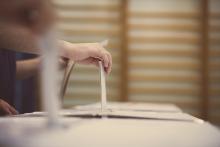
We must remove the veil that separates the least of these and count it not robbery to give them their legal, spiritual, and constitutional right to move beyond acts of mercy, but to build power for social change. As we begin to build prudent bridges, we break the sacred-secular divide and crippling covenants the silence us. We must renounce the manifesto placed upon our communities, schools, neighborhoods that allows the rich to reap where they have not sown. We must embrace our right to vote not only as a civil right, but a Godly right. We can no longer impose predatory measures upon ourselves; we have to remove the cloak of suppression.

Just this summer, a federal court struck down the North Carolina law, ruling that certain provisions of it “target African Americans with almost surgical precision.” The court added, “With race data in hand, the legislature amended the bill to exclude many of the alternative photo IDs used by African Americans” and “retained only the kinds of IDs that white North Carolinians were more likely to possess.” Yet, importantly, restrictive voter ID laws in a number of other states remain on the books, and will be in place for Election Day.

As the presidential election tightens and polls show Trump and Clinton within a few points of each other in North Carolina, Republican Gov. Pat McCrory has appealed the Supreme Court to reinstate previous voter ID laws and cuts to early voting, according to NBC News. This comes in the wake of numerous voter-ID laws throughout the country being struck down in the courts this past month.
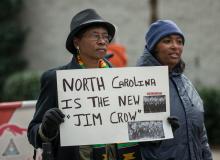
Since the summer of 2013, we have called this law — which the 4th Circuit struck down on Friday — a monster voter suppression bill. It was the first and the worst of many voter suppression measures to pass through state houses since the Supreme Court’s Shelby decision stripped the Voting Rights Act of its power to guarantee fair elections in this country. In many ways, it performed the new Southern Strategy of James Crow, Esq., which attempts to hold onto power as white voters become one among many minorities in this country. It is a strategy that necessarily depends on old fears, racism, and divide-and-conquer tactics.
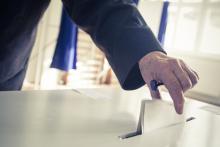
Are voting restrictions about voter fraud, or are they just a ruse to suppress likely Democratic voters?
Since 2010, conservatives have instituted voting restrictions in 21 states, the most well-known of which are laws that require photo IDs at the polls.

This week, as the five candidates still in the running for the White House turned their campaigns westward; vying for top spots in Arizona, Idaho, and Utah, pundits wondered aloud if voter suppression would make an impact on the general election. At the same time, miles-long lines formed in Arizona’s Maricopa County, the most populous and racially diverse county in the state. According to reports, lines of voters were still winding around blocks and parking lots even as news stations were projecting winners. Why? Because Maricopa County had reduced its polling places by 70 percent between 2012 and 2016, from 200 polling places to 60. How could they do that?
1. WATCH: How Stealing Elections Became Legal

2. ...And Do Something About It
Are you as outraged as we are about the state of voting rights? Join us in calling on your governor to protect everyone’s right to vote in your state.
IN THIS YEAR'S midterm elections, hundreds of thousands of Americans will have a much more difficult time casting their ballots than they did two years ago. And it won’t be because of rain, or early winter snows, or other acts of God.
It will be because powerful people don’t want them to vote.
Why? They stand to gain politically if the “wrong” people can be kept away from the polls. It’s the opposite of a “get out the vote” campaign—“keep out the vote” describes it better.
The tradition of keeping particular sectors of the population from taking part in the franchise goes back to the founding fathers. John Adams, for instance, believed that only rich, successful, smart people should vote—and only people of a certain race and gender, of course.
“Such is the frailty of the human heart,” Adams wrote in May 1776, “that very few men who have no property have any judgment of their own.” At the time, politicians in Massachusetts wanted to allow men who didn’t own property to vote. Adams thought that was a bad idea. For him, no property meant no vote.
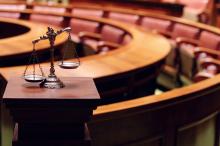
THIS SUMMER, two Supreme Court outcomes dramatically affected the reality of the words “Equal Justice Under Law.” In the first, a key component of the historic Voting Rights Act of 1965 was struck down, jeopardizing equal justice under the law especially for black, Latino, and low-income people whose voting rights have historically been assaulted and have continued to be suppressed as recently as the 2012 election. Efforts to increase barriers to voting for people of color, especially those with lower incomes, are already underway in several states. The Supreme Court’s decision was morally shameful.
The decision revealed how politically partisan this bench has become. The conservative justices have aligned themselves with the extreme right-wing politics that has taken over today’s Republican Party—one that has deliberately encouraged and practiced voter suppression against minorities, low-income people, the young, and the elderly.
America has made great progress on racial justice because of the tireless and courageous efforts of many. But the illusory idea of a “post-racial” America is exposed as a lie by this nation’s criminal justice system, the many recent attempts at racially based voter suppression, and now this decision by the Supreme Court.
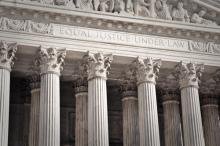
Our country’s laws represent our values and our moral compass as Americans. They set norms, define transgressions, and mete out consequences for actions. And almost 50 years ago, our nation realized the harassment, intimidation, bureaucratic shenanigans, and violence so many African-Americans and other minority communities experienced when trying to exercise their rights to vote and participate in our great democracy. Our intolerance of such injustice led to the passage of the Voting Rights Act of 1965 — a great triumph in the defense of life, dignity, and equality.
Notwithstanding the near-universal praise the Voting Rights Act has received for ending some of the most overt discriminatory practices in our country’s voting history, there are some saying the Voting Rights Act’s time has passed. In fact, on Wednesday, the Supreme Court will hear oral arguments from Shelby County, Ala., that a key provision of the Voting Rights Act is unconstitutional and should be struck down. These arguments are misguided. The Voting Rights Act remains a vital piece of our national moral commitment never to permit racial discrimination in elections again.
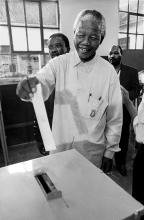
What does it feel like to have your vote stolen?
It sucks. It feels like someone literally let all the air out of my balloon animal.
Late in September, I happily filled out my absentee ballot request form to the DuPage Election Commission. Illinois had a new measure that allows for anyone to request an absentee ballot. I expected for there to be a delay.
So I waited.
And I waited some more.
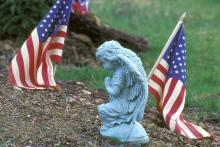
It’s here, God — Election Day in America. Today is the day when Americans everywhere are given the privilege and responsibility to exercise dominion (agency) at the polls.
Scripture tells us every human being is made in the image of God. We are, therefore, equally worthy of protection of the law. The United States Constitution and its Amendments tell us we are equally worthy of life, liberty, and the pursuit of happiness. Yet, at this very moment, laws stand poised to snatch dominion from the hands of the poor, the weak, and the vulnerable, ethnic minorities, students, and the elderly. Some scurrilous elected officials have worked behind the scenes to suppress the ability of voters to elect the person of their choice — all for the sake of politics
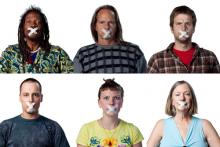
Of all the ugliness in Election 2012, nothing is more disturbing than attempts to prevent people from voting. Voter suppression strikes at the very heart of American democracy.
The flood of money into this year's campaigns has been bad enough, as wealth has sought to do what wealth usually seeks to do: gain control and preference.
The shouting of lies – not just shading the truth, but outright lies – has cheapened the liars and insulted the public.
Demagogic attacks grounded in religion, phony patriotism and race have undermined public trust in all politicians. It will take years to dig out from under the rot of such scorched-earth tactics.
But denying the basic right of citizenship to millions of voters is an offense we should all be protesting. For if the powerful can deny the vote to their opponents – especially the poor and people of color – they can deny the vote to anyone.
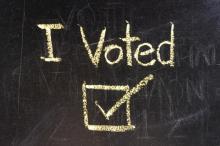
For the next 12 days it’s all about the ground game. With most voter registration deadlines passed, the fight against voter suppression has shifted focus from registration drives to calling banks, car-pools, and calls to vote early.
Bishop Dwayne Royster is Executive Director of P.O.W.E.R. (Philadelphians Organized to Witness Empower and Rebuild), a 37-member interfaith organizing coalition in Philadelphia. Royster is also lead pastor of Living Waters United Church of Christ in Philadelphia. In a recent interview Bishop Royster explained just how vital the fight against voter suppression has been for the people of Philadelphia.
According to a study conducted by the Pew Charitable Trust’s Philadelphia Research Initiative, Philadelphia is the 6th poorest large city in America with a poverty rate that held at 25 percent in 2011. The unemployment rate is higher than the national average at 11.5 percent, and nearly half of all high school students engage in a fist fight at least once in the course of a year. Tensions are high in the City of Brotherly Love.
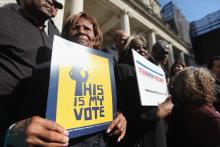
The 15th Amendment to the United States Constitution was the third in a triad of amendments crafted to protect the rights of recently emancipated African Americans. The 13th Amendment abolished slavery. The 14th Amendment granted citizenship to people who were once enslaved, regardless of race. The 15th Amendment, which was passed by Congress February 26, 1869 and ratified February 3, 1870, reads:
Section 1.
The right of citizens of the United States to vote shall not be denied or abridged by the United States or by any State on account of race, color, or previous condition of servitude —
Section 2.
The Congress shall have the power to enforce this article by appropriate legislation.
It took nearly a century of blood, terror, and tears, but in 1965 President Lyndon B Johnson and the 89th U.S. Congress passed the Voting Rights Act of 1965; legislation to enforce the 15th Amendment. Finally.
One year more than a decade later, in 1976, I walked hand-in-hand with my mother trudging up and down city blocks lined with row houses in our West Oak Lane neighborhood of Philadelphia. Each time we knocked and a neighbor came to the door, my mom, who served as the judge of elections for our neighborhood, asked: “Are you registered to vote?” If they weren’t, out came the clipboard.
I didn’t understand the legacy we were a part of that day, but with each sweep of the clipboard we were brandishing a non-violent weapon in the long fight of our ancestors to be and stay free. For 100 years — that’s five generations — they faced down the terror of burning crosses, threats to life and livelihood, and the elaborate labyrinth of Jim Crow voting laws — all set up to suppress their votes, all set up to crush their ability to exercise dominion.
So, when the Supreme Court announced recently that one of the cases it would take up in this session was a challenge to Section 5 of the Voting Rights Act, the hairs rose on the back of my neck.
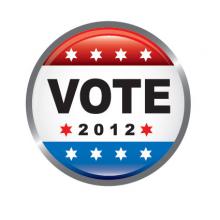
Editor's Note: This is the third article in Lisa Sharon Harper’s election season blog series, Watch the Vote. You can read the last article here.
With 28 days to go until our nation chooses its 45th president, a string of court victories have knocked down Jim-Crow-style barriers to voting that have been erected in states across the nation. But 13 states are still under the oppressive weight of laws designed to suppress the vote.
According to the Brennan Center for Justice, starting in early 2011, 41 states introduced legislation to restrict voting laws. Nineteen quietly passed 25 laws and two executive actions, some of which require government-issued photo IDs, proof of citizenship, fewer early-voting days, the elimination of Election Day voter registration, created barriers to voter registration drives, and created more obstacles for citizens with past criminal convictions.
The good news is that over the past few months we have seen one court case after another block the enactment of the worst provisions of these new Jim Crow laws. According to a recent Brennan Center study, 10 courts have blocked or blunted restrictive voting laws — and the Department of Justice blocked one more — since Oct. 3.

[Editor's Note: This is the first article in an election season blog series called Watch the Vote.]
In today's hyper-politicized climate, all of the hoo-hah about voter suppression can sound like a bunch of partisan pandering on both sides.
If you're just tuning now, it can easily look like Democrats are whining and crafting conspiracy theories over something that really won't matter in the end, anyway — so why waste your breath?
Or, for the even more cynical, sure, it might matter, but there's nothing we can do about it — so again, why waste our breath?
Here's why. Check this out.